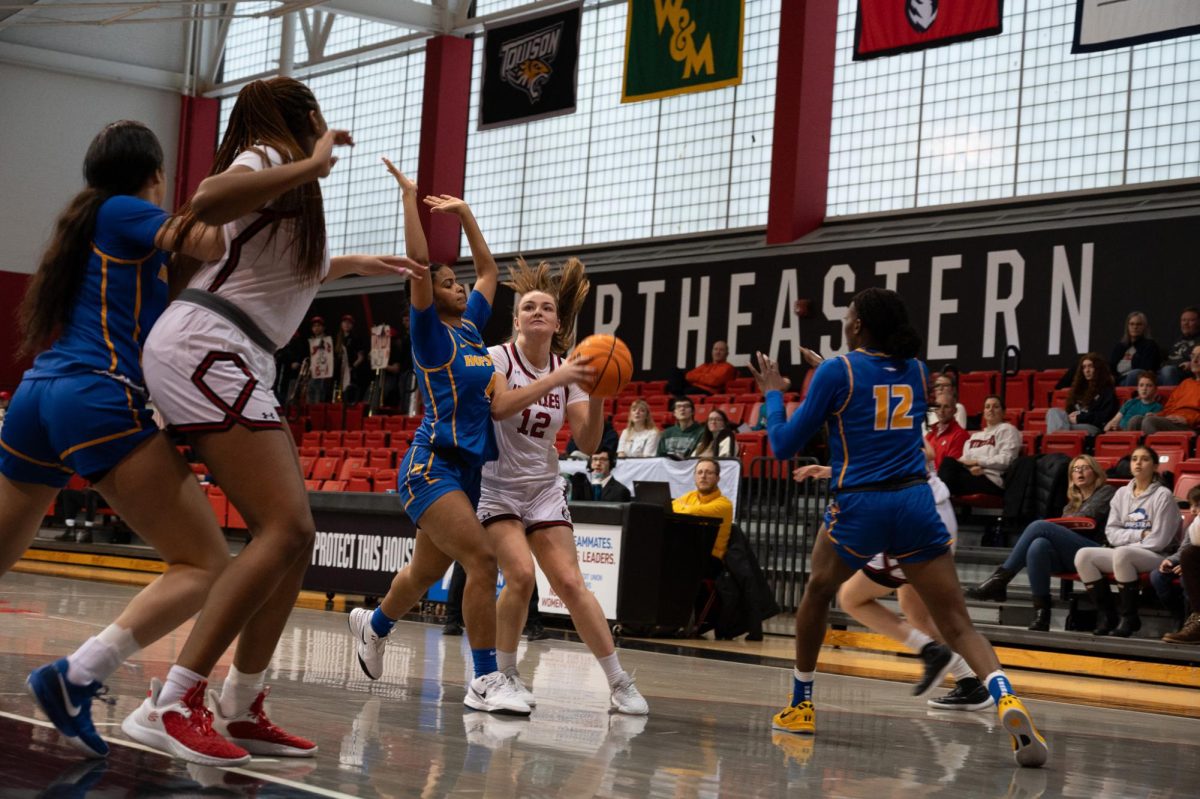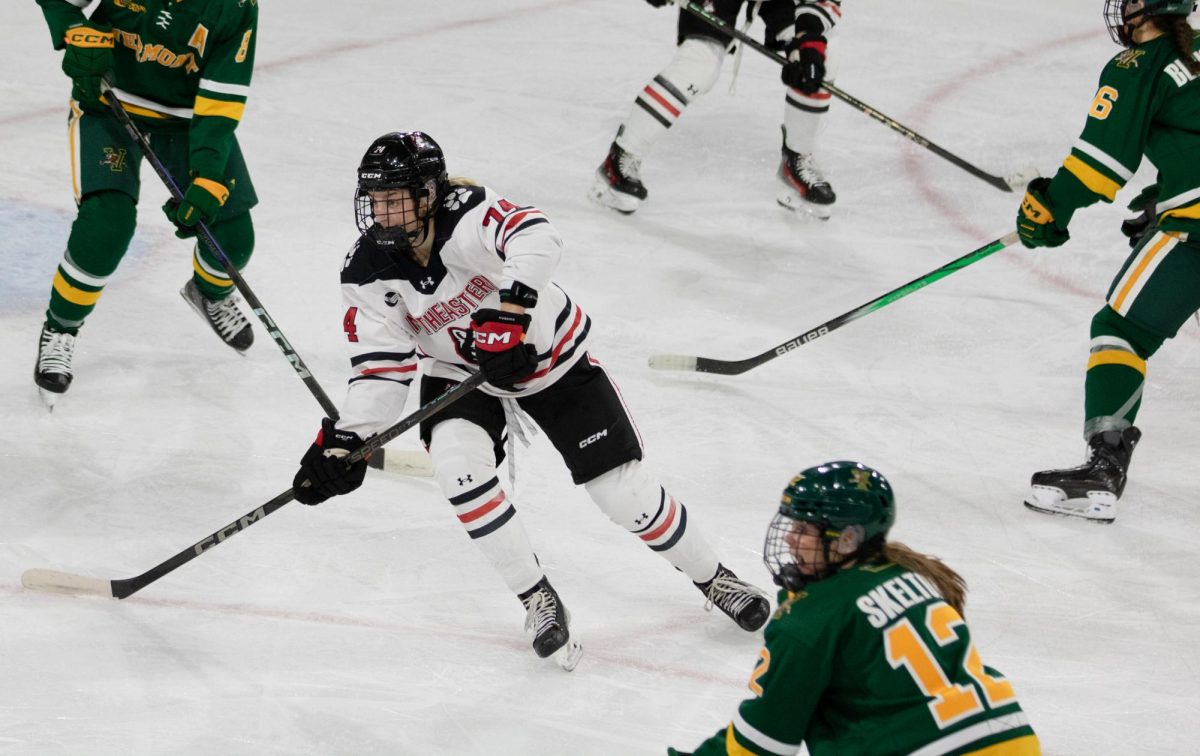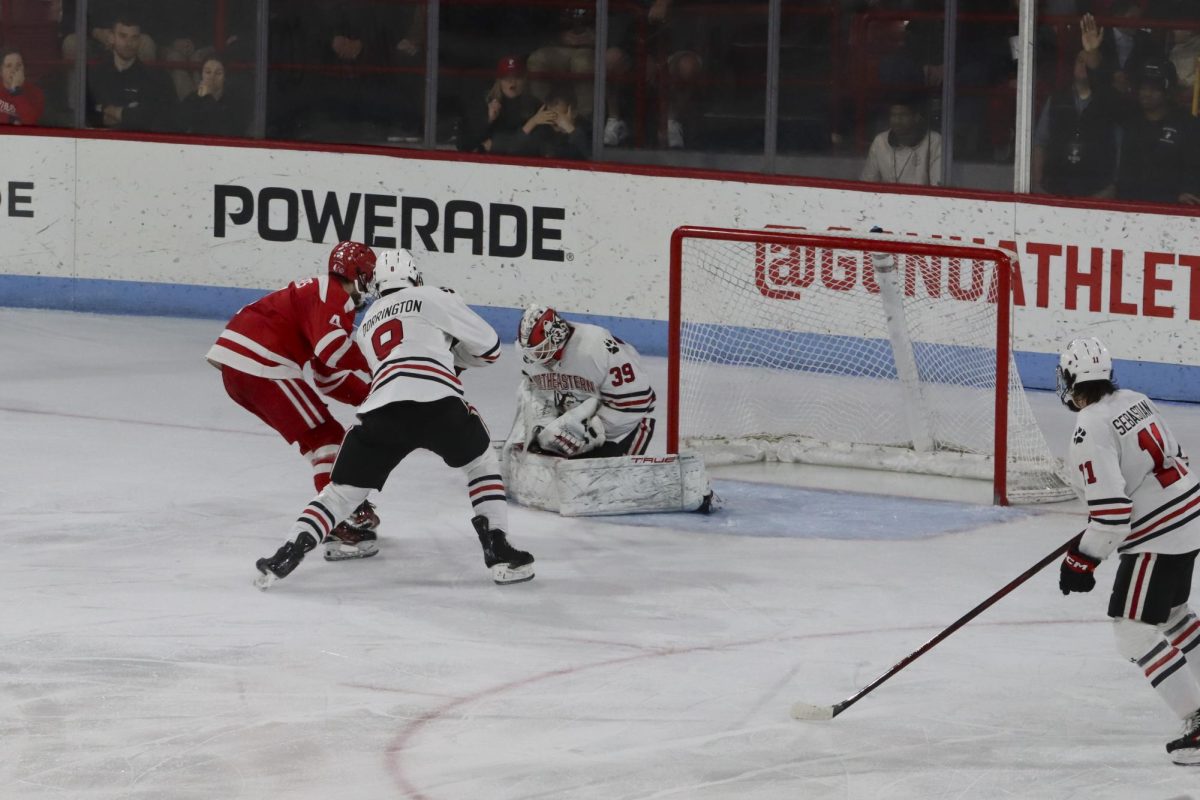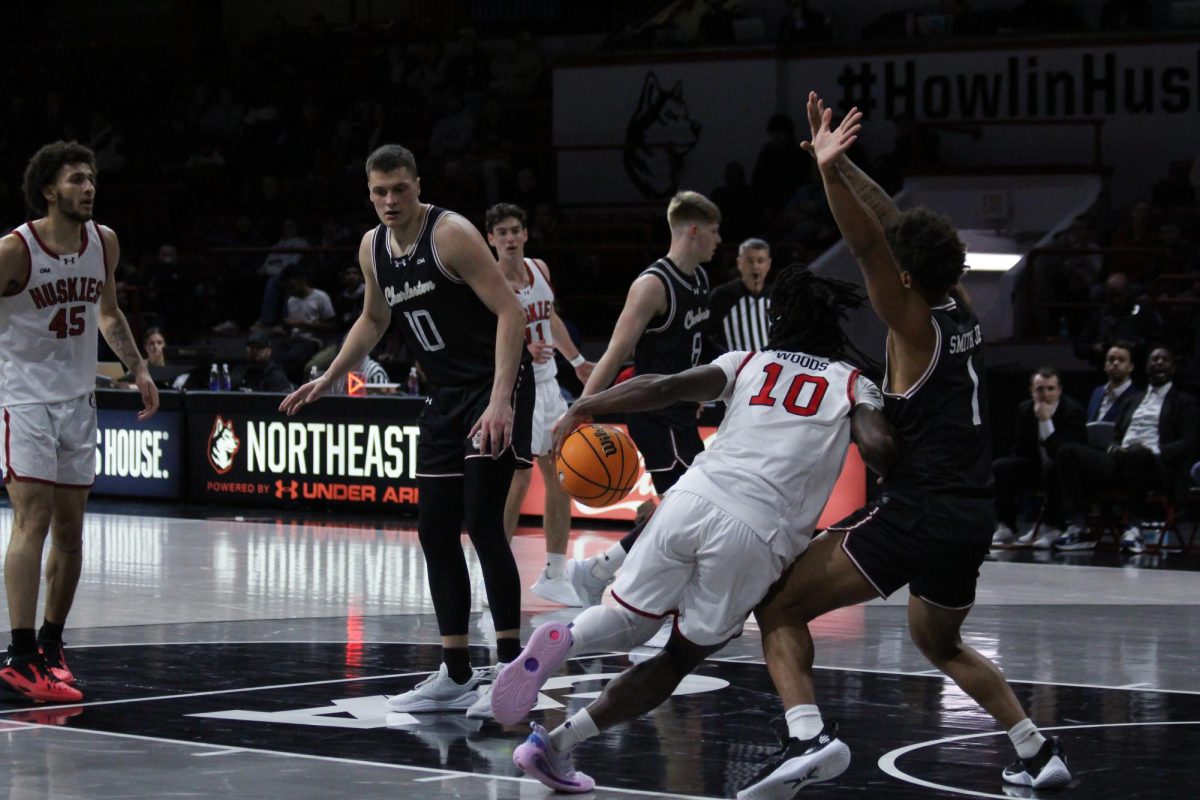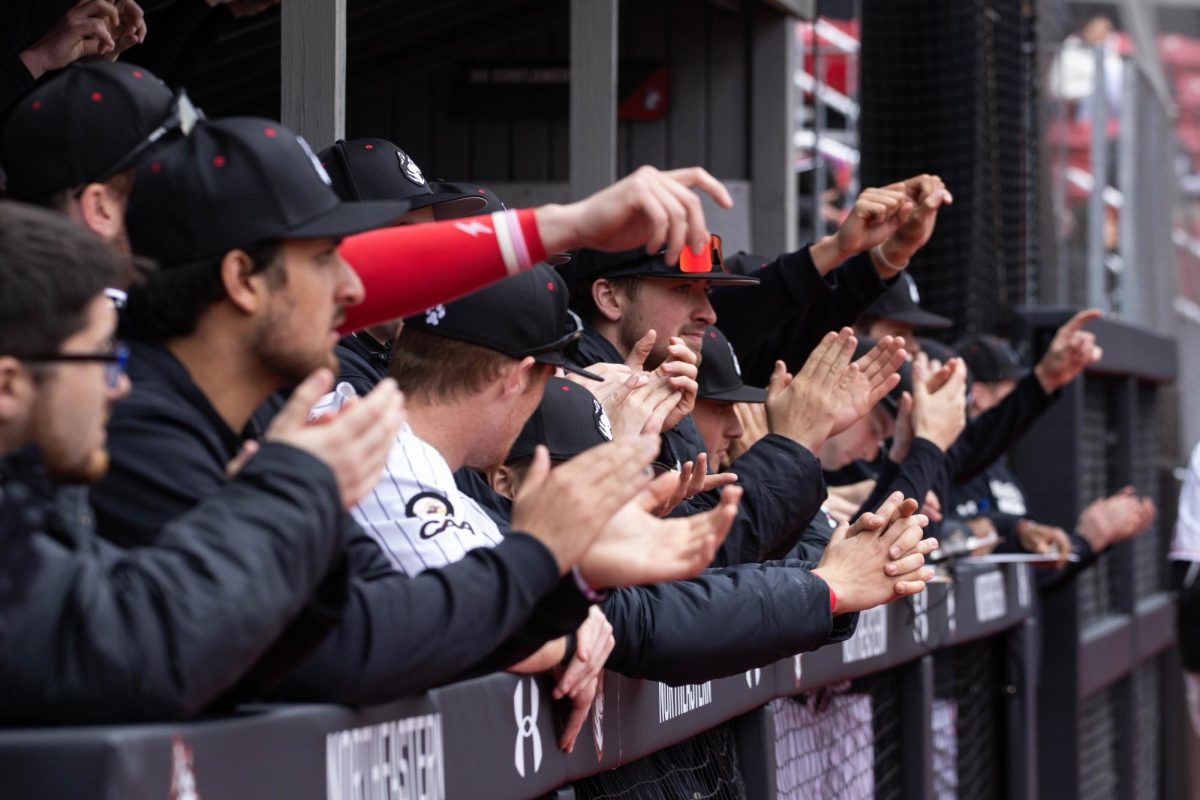By Eoghan Kelly, News Staff

The Northeastern University athletics programs have not yet reached their competitive potential, and until they do, the athletics department will not be satisfied, Athletics Director Peter Roby said in an interview with the News.
At least eight Northeastern teams have competed in post-season play and contended for Colonial Athletic Association (CAA) or Hockey East championships this year, but, Roby said, the department will continue to strive for improvement until teams are winning conference titles and competing for national championships in multiple sports “on a consistent basis.”
“We’ve shown that we can compete in the leagues we’re in – we just have to do it consistently now,” said Roby, who his in is fifth year as athletics director. “We feel like we’re knocking on the door. We’ve got teams that are finishing first, second and third in the conference [in the regular season]. Now it’s just a matter of – ‘Can they finish the deal?’”
So far this year, Northeastern has failed to win a conference championship in any sport, despite capturing regular season titles in women’s hockey – the first in program history – and earning top-two regular season finishes in both field hockey and volleyball. The field hockey team did earn an at-large bid to the NCAA tournament but lost in the first round to Pennsylvania State University, 1-0.
The lack of postseason success is what has left athletics disappointed. The goal every year, Roby said, is not to contend for conference championships, but to win national championships.
“We have not had as many teams get bids to the NCAA tournament as we would like to have get,” Roby said. “Our goal is to win a national championship in hockey, both men’s and women’s. Our goal is to put our men’s and women’s basketball teams in the NCAA tournament. Our goal is for our crew teams to win the sprints and compete for a national championship in rowing.”
Despite their disappointing performances, Roby acknowledged that some Northeastern sports have collectively displayed its potential, which he attributed to the re-investment in a number of programs and athletic department resources.
After cutting the football program at the conclusion of the 2009 season, a majority of the 65 scholarships that were originally allocated to football players weredistributed to various teams. While many teams, including both men’s and women’s hockey, men’s and women’s basketball and field hockey, had already reached the NCAA scholarship limit, teams like baseball and men’s rowing have benefitted from the increase in funding for student athletes.
In Roby’s first year (2007) as athletics director, the baseball program was only allocated five and a half full scholarships per season. Since football was eliminated, baseball has added enough scholarship money to reach the NCAA limit.
“It simply means that we have the resources to bring in the most talented of players that can commit to our program, and that’s what this freshman class is looking like,” baseball head coach Neil McPhee said. “And it’s not just our freshman class this year. It’s looking like a losing streak right now, but the future is going to be the freshman, sophomore and junior class.”
Men’s rowing coach John Pojednic said the benefits of scholarship reallocation for his team are twofold. They have allowed the rowing program to compete with the top 20 rowing programs in the country and reduces the financial burden that attending Northeastern places on non-funded student athletes.
“The university has made great strides recently to increase the amount of financial aid we offer to the student body in an effort to level the playing field when it comes to our university’s ability to compete for the best student [athletes] from the US and abroad,” Pojednic said. “Without question, this will enable us to reach and sustain a very high level of competitive excellence.”
The Athletics Department also made a commitment to improve facilities, making major renovations to Matthews Arena, Parsons Field, Solomon Court and the Cabot Gymnasium in Roby’s tenure. He said more funding was allocated for coaches’ salaries and the department hired a number of additional sports medicine, game operations, equipment, athletic development and strength and conditioning staff.
By making these investments and setting lofty expectations – such as committing to send a men’s rowing boat to the 2013 Henley Royal Regatta in the U.K., one of the largest regattas in the world – Northeastern teams have been able to attract a significantly wider array of top-end talent, Roby said. Recent recruits included players that were recognized across conferences like freshman women’s hockey forward Kendall Coyne, freshman men’s hockey forward Ludwig Karlsson and freshman men’s basketball forward/guard Quincy Ford.
“We’ve had the conference player of the year in several sports. We’ve had the rookie of the year in several sports,” Roby said. “We’ve got quality athletes here and our facilities have really improved.”
The players, staff and resources are all in place. What’s missing now, Roby said, is support.
That support manifests itself in two forms. Primarily, Roby said Northeastern needs to increase fan support and create a more intimidating home-court advantage to compete with the likes of Virginia Commonwealth University, Drexel University and George Mason University in the CAA and other teams across Hockey East.
Recent efforts to do such, included providing shuttle buses to all games at Parsons Field and increasing game marketing to the Northeastern student body, have laid a foundation to increase fan attendance, but Roby said a “chicken and the egg” scenario has developed: Teams need loyal fans to win and be successful, but fans won’t provide a presence until the teams prove they can win.
“We need to create an environment where [opposing] teams have a tough time playing here, and over the last couple years, it hasn’t been that tough to play here,” Roby said. “That’s the priority for us in this off-season, and we’ve already been spending a lot of time talking about what are we going to do to put people in the stands. We’ve got to get students to come out to support our teams.”
The other form of support, Roby said, comes from alumni. Northeastern set a record for alumni donations in 2011-12 and Roby hopes to surpass that mark with each coming season, but added that he would also like to see increased alumni attendance at games.
Once all pieces are in place – players, staff, resources, fans and alumni support – Roby said that it will only be a matter of time until Northeastern is consistently competing for conference and national championships.
But Husky fans won’t need to wait long. With some luck, Roby thinks that time could come as early as the next season.
“Sometimes you need a little bit of luck,” Roby said, but added that Northeastern “also need[s] the time to allow these investments to take hold and ferment and pay dividends. I understand that people are frustrated and want to see us win and see all these things come to fruition, but I don’t think we’re that far away. I expect us to make hay next year.”
Roby said Northeastern teams would have benefitted from a bit more luck and time this year as well.
After earning 21 wins, the most since joining the CAA in 2005, the women’s volleyball team lost a five-set thriller to No. 6 VCU in the CAA semifinals in November. Just two weeks earlier, the VCU Rams ended another Northeastern season when they also knocked the women’s soccer team out of the CAA semifinals with a 1-0 victory.
Meanwhile, the men’s soccer team lost a penalty shootout to the University of Delaware in the CAA quarterfinals in Harrisonburg, Va., after going undefeated at home in 2011.
Though he said he was disappointed with overall postseason play, Roby said he was pleased with the fact that Northeastern sent four fall teams to CAA tournaments, a feat matched only by the College of William & Mary.
“I was pleased that we had the kind of success that we had in the fall with our teams,” Roby said. “We performed pretty well … we’re competing well and yet we don’t feel like we’ve reached our potential, so that’s exciting.”
But the winter was particularly cold for the Huskies. Both men’s and women’s basketball and men’s hockey finished with losing records, while the men’s hockey team missed the Hockey East playoffs altogether for the second time in three years.
Roby attributed the men’s hockey team’s struggles to its difficult conference schedule and the difficulty of acclimating a young team to a new coaching staff.
“It was a really up and down year,” Roby said. “The schedule really didn’t do us any favors. It was very unusual for anybody in Hockey East and for us in particular to start the year with 10 straight Hockey East games … and with a new coaching staff and players learning to play together, it was a tough thing for us to overcome. [But] we proved that that team can play with any team in the country.”
The men’s hockey team reached one of its lowest points of the season when it was blown out in the Beanpot semifinals, 7-1, just 24 hours before the women’s team won its first Beanpot title in 14 years in a 4-3 overtime triumph over Boston University.
While the men’s team missed out on the post-season by way of a tiebreaker to the University of Massachusetts-Amherst – with which Northeastern finished the regular season tied for eighth place with 22 points – the women’s team continued to excel after its Beanpot performance. The Huskies rode the play of United State College Hockey Online Rookie of the Year Coyne and senior goaltender and Patty Kazmaier Award finalist Florence Schelling to the top of the Hockey East standings by the end of the regular season.
But after a 2-0 loss to Providence College in the Hockey East Tournament semifinals, the women’s season was over. The Huskies failed to earn an at-large bid to the NCAA tournament.
Roby said the end of the women’s season was premature and they deserved a better finish given how they played all year.
“We felt like they had a real disappointing end to their season and we just got caught in a numbers game with postseason play,” Roby said. “I don’t think there’s too many people in the country that don’t think that we’re one of the best teams in the country, and I think we played like it.”
The number of disappointing results across all sports yearonly leaves Roby excited for 2012-13, he said, as he pointed to a number of returning starters on multiple teams, strong recruiting classes and more experienced teams and coaching staffs as a reason to look forward to next year.
As he put it, Northeastern is a “sleeping giant,” and 2012-13 could be the year that it erupts onto the national athletics scene.
“We’ve, I think, raised the level of competition across the board in our sports, but we still think we’re just scratching the surface,” Roby said. “We have very talented athletes, we have a group of coaches that are very good at what they do, and we have a school that’s easy to recruit to … still there’s more to do, but we like where we’re headed.”



